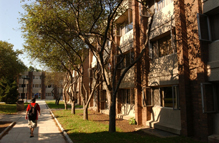There was a time when frustrated Rutgers students might go to their local college’s residence life office with a problem about their dorm room, only to be told to go to the universitywide housing office on the College Avenue Campus – a trip requiring bus, bike, or a long walk on foot.
Now, students on any campus can find staff from university residence life and housing under one roof. Four roofs actually – one each on the Busch, College Avenue, Cook/Douglass, and Livingston campuses in New Brunswick and Piscataway.
“For years we told students when they came in to us, ‘Go to the housing office’ – we’re never going to have to say that again. They just come to one office and then it will be our responsibility to help them figure out which staff can be the most helpful to them,” said Joan Carbone, the new executive director of the first universitywide Office of Residence Life in New Brunswick. “Although we are not joining together in terms of our reporting structure, we are coming together in every office on every campus.”

Subsequent to recommendations made by the president’s Task Force on Undergraduate Education and approved by the Rutgers Board of Governors, residence life is now a universitywide function. Housing, which was always centrally organized, now shares office space with residence life on every campus, in addition to the central offices at Administrative Services Building III on Cook Campus.
The move erases previous inequities among residence life staff members on different campuses. Because Rutgers, Douglass, Livingston, and Cook Colleges each had their own residence life offices and policies, resident assistants and counselors were paid differently, had disparately sized staffs, and supervised different numbers of students.
Because the colleges had varied approaches to residence life, people put their past differences aside when developing job descriptions and policies for the universitywide residence life office. “Our goal was to start fresh and not talk about what we did in the past. We never put the four college job descriptions for resident assistant on the table – no one ever got to see them; they only knew about their own and nothing else,” said Carbone, who was previously associate dean of student services at Rutgers College. “That translated into people saying ‘Maybe we ought to do this’ instead of ‘This is what we used to do.’ ”
Carbone, who has been executive director since September 15, 2006, and managed the transition from college-based residence life to the present system, envisions the Livingston Campus as more lively than it has been in years past.
More first-year students will live on the campus. All of the main student lounges in the Quad residence halls are being renovated and a new café in one of the Ernest A. Lynton Towers will have a stage for poetry readings, musical acts, and other cultural and entertainment options.
“I think that it’s going to be a very lively campus,” Carbone said. “All of the student affairs offices are going to be focusing on programming on Livingston. ... We’re putting outdoor furniture outside the halls so we can do outdoor programming when the weather is nice.”
Room assignments for continuing students are already complete. With many of the spaces on Livingston reserved for first-year students, Carbone said she believes most students are happy with the housing they received, with the possible exception of some science and engineering students who did not get their first-choice housing on Busch Campus. Previously, only students from Rutgers College, the School of Engineering, and the Ernest Mario School of Pharmacy could live on Busch; now, all students have the choice of living on the tech-oriented campus.
“It was a long and sometimes complicated process because we had to offer all spaces to all students,” Carbone said, adding that students appreciated being able to participate in the housing lottery online.
Residence life will work with the Office of Learning Communities, another new, universitywide entity designed to integrate students’ academic and cocurricular experiences. Rutgers’ perennial diversity of students will play a key role in residence hall programming, as it always has. But this year will present new challenges and opportunities since students who have previously lived on opposite campuses will be living together.
“We have a very diverse population. To me, there is a difference between tolerance and appreciation. We can tolerate each other and not really learn a whole lot,” Carbone said. “But we have to understand the value of the differences. And I think residence halls are in a unique position to do that. It’s a chance to change the world because we have thousands of students … If we can teach them how to live together, how great will that be when they leave here?”
Residence Life Facts
Housing is responsible for student living facilities; residence life is responsible for the students living in those facilities.
The Office of Residence Life has 22 professional staff and six support staff.
Four professional staff members – Carbone and associate directors Lynn Kreuger, Mike Tolbert, and Susan Boyd – work in ASB III, the central office for residence life. Others work at locations on each campus in New Brunswick and Piscataway.
Campus residence life offices:
- Clothier Hall on College Avenue Campus
- 581 Taylor Road on Busch Campus
- Lucy Stone Hall on Livingston Campus
- PAL Building on Cook/Douglass Campus